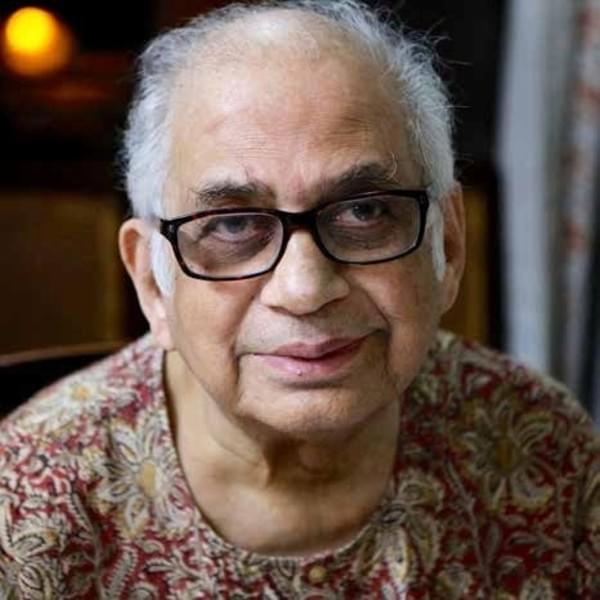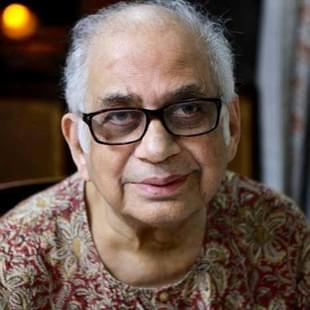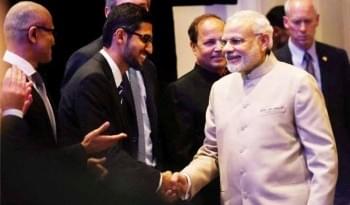Magazine
The Left And Scientific Sense
Shanthu Shantharam
Dec 16, 2015, 07:53 PM | Updated Feb 10, 2016, 05:55 PM IST
Save & read from anywhere!
Bookmark stories for easy access on any device or the Swarajya app.


If the “left-liberal” scientific community observed an even-keel approach, it would have demonstrated the scientific temper that it deludedly says is absent in India under the Modi government.
At last, the contagious disease of returning State honours has afflicted the Indian scientific community as well. Lo and behold, none other than Dr Pushpa Bhargava leads the pack by offering to return his Padma Bhushan award as he feels that India has become unlivable since the Modi dispensation took office.
As is well known, the Padma awards lost their sheen a long time ago because of the political influence with which they get distributed every year. It should be noted that many deserving people have received those awards, but that norm was thrown out of the window long ago. Return of these awards should not rankle anyone as it is a non-event. In fact, no one is losing sleep over it. As the Kannada poet-saint Purandara Dasa’s song goes, it is like “throwing the tank water into the same tank”.
Following artists, cinema directors and historians, a group of 130 scientists wrote to President Pranab Mukherjee to take suitable action to stem the tide of intolerant acts in the country. The Inter-Academy Panel on Ethics in Science (IAPES) also voiced its concerns about the lack of scientific temper as exhibited by the actions of certain sections of society (read Hindutva outfits). When one gleans through the list of scientists who have affixed their signatures, almost all of them are unknown to the public save for Dr Pushpa Bhargava who has the knack of keeping himself in the limelight for all and sundry reasons. IAPES demands exemplary punishment for those whose acts erode human and civilizational values as if these terms have been defined by some court. No matter how much these worthies in arts and science communities say that this is not against the present government of PM Modi, it is all against PM Modi. It is just like when someone says that it’s not about the money, you can bet it’s about the money. The problem is that within 60-odd years of establishing the Indian republic, we have become so deeply accustomed to the Nehruvian socio-political system and have created an industry of such creepy and crony socialism that in spite of so many miseries, there is also comfort in it because it ensures that no one else is getting ahead. In India, most often, people feel satisfied even if they don’t progress, as long as others do not progress either. This is like cutting one’s nose to spite the face.

The truth is that none of these award wapsi folks have been happy ever since Modi was elected to the highest office in the country. Starting the day after his swearing into office, they have launched a campaign to unseat him, but they have to wait until 2019 for that. But these people have already started the 2019 election campaign and they don’t miss a single opportunity to denigrate him and besmirch his reputation. India’s scientific community is not known to show its political face much and they do not normally react to political happenings in the country. This time seems to be a singular exception. By nature, scientists are politically and publicly reticent people immersed in their closed cozy world of science. They rarely get into the politics of the day. Scientific research enterprise is a time-consuming affair and they do not wish to waste their precious time in any kind of political tamasha.
It is really very surprising that India’s scientific community has indulged in a petition to the President now, who can anyway only pass it along to the government of the day. If the scientists were really serious of protesting about intolerance, they should have submitted a petition to Governors in the states in which the abhorrent incidents took place as it is a law and order situation, a subject completely in the domain of state rights. The government of PM Modi is quite correctly not saying much about these award wapsis. It is the privilege of the awardees to do whatever they want with their awards. The government of the day have nothing do with it as the awardees were chosen by select committees of earlier governments. When most of these scientists are unknown to the public, the public will not lose sleep over their returning the awards. Of the half a dozen film makers returning their awards, the crazy world of cine goers might not have heard of even one of them, and why they got the awards in the first place. The same applies to the scientists.
It has not occurred to the public that at the rate at which people are rearing to return their awards, it may be a good idea to place a large waste paper basket in the heart of Delhi for anyone to throw his/her award into it where most of them have anyway eminently belonged. Dr Bhargava is prone to megalomania, and cannot suffer too long without some kind of publicity. The award-wapsi movement came at a time when he had not been in the news for a long time. This is not the first time he has returned something. In the past, he resigned his membership of all academies of sciences in the country as he thought he deserved a lot more than that and that he did not want to belong to any club that would allow him to become one. Frankly, no one shed a drop of tear for his abandoning the science academy memberships. No one misses him in the world of science either in India or elsewhere.
Ever since he retired from the Centre for Cellular and Molecular Biology (CCMB), Hyderabad, he has been struggling to keep himself relevant to the nation, but to no avail. He desperately wanted to become the Secretary to the Department of Biotechnology, and has been frustrated for no one ever considered him for the job. He has a streak of anti-establishment tenor in him, which is why he was asked to resign from the Knowledge Commission by Sam Pitroda. The then PM Dr Manmohan Singh did not bother to acknowledge his letter of resignation at the time. Did India suffer because Dr Bhargava resigned from the Knowledge Commission, or for that matter the work of the Commission itself?
He will quickly go against any organization, if he does not get his way. He had built up his reputation (read notoriety) by dubiously claiming to be the father of modern biotechnology in India, a laughable notion to say the least. He even went on to claim that he coined the phrase “genetic engineering”, another falsehood. Only the ignorant media and the non-governmental activists believe that he has a great scientific standing that can be used to further their cause. No one in the field of modern molecular biology has heard of Dr Bhargava’s contributions in gene-splicing technology. This is the problem with many Indian scientists who seek fame or notoriety by claiming to have thought of a Nobel prize-winning idea long before the prize gets awarded to X, Y or Z. If one cannot do real scientific research by slogging in the lab, one cannot claim ownership of the idea just because he or she had discussed it across a dining table or in some bull session.
Bhargava’s penchant for megalomania was such that when he was the director of CCMB, he used to convene scientific meetings just to think up Nobel Prize-winning ideas, as if such ideas appear if one only thinks deeply. His cherished the deep desire to grab a Nobel for some idea emanating from his laboratory. He remains a deeply disappointed soul that his Nobel dream has not come true to this day. If one wants to see evidence of his boastfulness, just visit the entrance lobby of the CCMB—you will see a larger-than-life mural of him on the wall. Without a doubt, he established the CCMB, one of the most modern research laboratories of India in biological sciences, thanks to Rajiv Gandhi’s largesse, and a reflection of Bhargava’s closeness to the Congress. He was amply rewarded with a Padma award, which he now wants to return. It is a good gesture—at least one Padma award will be spared of ignominy.
When Dr Bhargava was not really in the public eye about a dozen years ago, he jumped on the anti-GM bandwagon to make himself relevant. He merrily joined hands with the anti-GM lobby to be in the news. The only reason he opposes GM crops technology is that it gives him a platform to be in the limelight. Otherwise, this is the same Dr Bhargava who, when he was the director of CCMB, did not want any plant science research done there. But, all of a sudden, in his retirement days, he becomes an expert of plant molecular biology and genetic engineering, and finds all sorts of baseless scientific faults with GM crops and wants the moratorium on it to continue. He praised former Union Environment Minister Jairam Ramesh as a national hero for imposing a moratorium on Bt brinjal. Dr Bhargava has been singularly disingenuous and intellectually fraudulent by ignoring mountains of scientific evidence and the opinions of leading scientific bodies and academies to protest against GM crops. If he had done even a day’s worth of research in plant sciences, he would have staked a claim to be the father of India’s Green Revolution as well.
Dr Bhargava, in an online interview to Atul Dev in The Caravan (November 11, 2015) says that Modi’s government has lost its path to democracy. Is he serious? What path to democracy? Who has dismissed the government and taken over the country? He talks of Hindu religious dictatorship. He must be really hallucinating. Can anyone living and breathing in India today make any sense of this nonsense uttered by Dr Bhargava? He accuses Modi’s government of lacking scientific temper by completely forgetting how Jairam Ramesh scuttled GM crops technology without an iota of scientific evidence. The most unscientific thing was the UPA1 and UPA2 stalling GM crops without any scientific basis. As this moratorium suits Dr Bhargava, it is scientific temper for him.
He seems to forget that when Narendra Modi went to visit Japan and Australia, he personally sought out stem cell researchers and plant genetic engineers to explore the ways and means of bring the fruits of those technologies to India for India’s growth and development. When he went to Silicon Valley, he spent considerable amounts of time wooing IT giants to come and invest in India. Was all this because he has no scientific temper? This writer had met Mr Modi for more than an hour in Gandhinagar when he was CM of Gujarat. He was the only politician who really intently listened to my presentation on modern plant genetic engineering, and fully understood the success of Bt cotton in Gujarat. He was really smart and asked me pointedly: Are there any ready technologies for harnessing the vast bio-resources on the Gujarat coastline? Bhargava is speaking through his hat when he says that Modi’s government does not have the scientific temper. Somebody needs to check to verify if Bhargava was partly responsible for inserting the “scientific temper” clause in the Constitution. Given his boastfulness and false claims, Bhargava’s word cannot be taken for granted. Can anyone say that Indians are being told what to wear, what to read and how to live by the central government? This is the kind of irresponsible nonsense Dr. Bhargava is perpetuating in The Caravan interview.
The Modi government has not uttered a word save for Arun Jaitley’s honest assessment of award wapsi that it is manufactured dissent. Dr Bhargava harps too much on scientific temper or lack thereof in the government and in the country. He seems to think that scientific temper means everyone should think and talk like him. People are smarter than that, but people like Bhargava will never know that. Dr Bhargava alluded to PM Modi’s reference to the elephant-headed God Ganesha as an example of organ transplantation. Modi, by no means, suggested that organ transplantation was done in ancient India; it was merely a reference to the ability to imagine stupendous things and bring them to reality. Just look at Bhargava’s opposition to GM technology. He is completely out of his depth here.
It is true that just as there are loony lefties, there are also loony rightists and fundamentalists in a pluralistic democracy like India, but that does not mean there is no any scientific temper in the country. India has a population of a billion and a quarter, and by sheer theory of probability, one can and should expect a certain minority of lunatics who have crazy ideas about life and the world. That does not mean the majority of the country is like that. If the scientific community and Dr Bhargava observe an even-keel approach to all that is happening around the country, then they would have demonstrated the proper scientific temper that he is so aggrieved about.
Dr Shantharam is an Adjunct Professor of Biotechnology, University of Maryland—Eastern Shore, Princess Anne. A former biotechnology regulator with the United States Department of Agriculture, served as a biotechnology consultant with the World Bank, Asian Development Bank, UNIDO and UN-FAO. He is also a Visiting Professor at the Seed science Center at Iowa State University, Ames.
This article was carried in the December issue of the magazine. Get Swarajya delivered to your home – subscribe now.
Shanthu Shantharam is a Professor of Biotechnology at the University of Maryland-Eastern Shore. A former biotechnology regulator with the United States Department of Agriculture, Dr. Shantharam has served as a consultant to UN-FAO, UNIDO, World Bank, and Asian Development Bank. He was responsible for initiating the development of India’s biotech regulations in the early 1990s when he was a Fulbright Scholar at the Indian Agricultural Research Institute.





